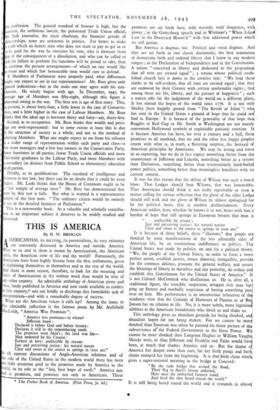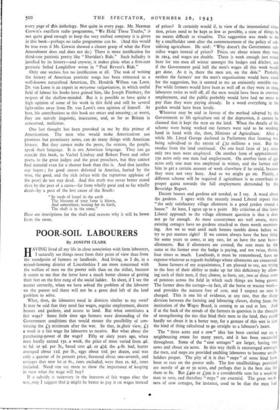THIS IS AMERICA
By D. W. BROGAN
AMERICANISM, its meaning, its potentialities, its very existence are constantly discussed in America and outside America. What to us and to them is meant by Americanism, the American spirit, the American view of !if.; and the world? Fortunately, the
ericans have been highly literate from the first settlements, given
o explaining themselves to themselves and to the rest of the world. nd there is more reason, therefore, to' ook for the meaning and miss of Americanism in the written word than would be true of fly other country. An admirable anthology of American prose and erse, lately published in America and now made available to readers rt this country,* sets out boldly to discharge this formidable task of terpretation,—and with a remarkable degree of success.
What are the American voices it calls up? Among the items in is admirable collection is the famous poem by Mr. Archibald acLeish, "America Was Promises ":
" America was promises—to whom?
Jefferson knew: Declared it before God and before history: Declares. it still in the remembering tomb.'
The promises were Man's ; the land was his—
Man endowed by his Creator: Earnest in love: perfectible by reason: Just and perceiving justice: his natural nature Clear and sweet at the source as springs in trees are."
n all current discussions of Anglo-American relations and of
le role of the United States in the modern world there has been oo little attention paid to the promises made by America to the
'enld, to its role as the " last, best hope of earth." America was and is promises, and promises not only to Americans. These * The Pocket Book of America. (Pilot Press, 3s. 6d.)
promises are set forth here, with wannth, with' eloquence, with power ; in the Gettysburg speech and in Whitman's " When Lilaoi Last in the Dooryard Bloom'd " with that additional power which we call genius. - But America is dogmas, too. Political and social dogmas. And they are set forth in two classic documents, the best statements of democratic faith and ordered liberty that I know in any modem tongue ; in the Declaration of Independence and in the Constitution.
A nation " conceived in liberty and dedicated to the proposition that all men are created equal " ; a nation whose political estab- lished church lays it down in the creative text: " We hold these truths to be self-evident, that all men are created equal ; that they are endowed by their Creator with certain unalienable rights ; that among these are life, liberty, and the pursuit of happiness " ; such a nation asks for the judgement of the world on a different plane, It has stirred the hopes of the world since 1776. It is not only Shelley (here happily quoted from " The Revolt of Islam ") who has seen in the United States a ground of hope that he could not find in Europe.' It is because of the generality of that hope that • Ruggles at Red Gap or Mr. Smith at Washington are not merely convenient Hollywood symbols of exploitable patriotic emotion. It is because America has been, for over a century and a half, these promises to all mankind, that we and the other less happy peoples resent with what is, in truth, a flattering surprise, the betrayal of American principles by Americans. We may be wrong and naive in so expecting, but we do in fact expect something better from the countrymen of Jefferson and Lincoln, something better as a system than Darlanism, something better than ostentatiously hard-boiled power politics, something better than meaningless banalities with no current content.
It was for this reason that the defeat of Wilson was such a moral blow. That Lodges should beat Wilsons, that was lamentable: That Americans should think it not really regrettable or even a,' matter calling for serious reflection that the ghost of the elder Lodge should still walk and the ghost of Wilson be almost apologised for by his political heirs, that is another disillusionment. Every American soldier, here, whether he knows it or not, bears with him at burden of hope that still springs in European breasts that man is " . . perfectible by reason ;
just and perceiving justice: his natural nature Clear and sweet at the source as springs in trees are."
It is because of these beliefs, these " illusions," that people are shocked by some manifestations of the less admirable sides of American life, by an ostentatious indifference to politics. The United States was made by politics; on and for a political theory.
" We, the people of the United States, in order to form a more perfect union, establish justice, insure domestic 'tranquillity, provide for the common defence, promote the general welfare, and secure the blessings of liberty to ourselves and our posterity, do ordain and establish this Constitution for the United States of America." It is not Colonel McCormick who disillusions us. He is, after all, a traditional figure, the irascible, suspicious, arrogant rich man lap ping up flattery and morbidly suspicious of having something put over on him. His performance is an unconscious refutation of the academic view that the Comedy of Humours of Plautus or of B9 Jonson has no relation to life. No, it is more subtle, more ingenioue nibblers at the American foundations who shock us and shake us.
This anthology gives us abundant grounds for being shocked, and abundant hopes for not being shaken. For we cannot be mor shocked than Emerson was when he painted his bitter picture of the subservience oethe Federal Government to the Slave Power. Wei cannot be more shocked than Langston Hughes or William Vaughn Moody were, or than Jefferson and Franklin and Paine would have been, at much that shames America and us. But the shame of America has deeper roots than ours, for her birth pangs and birth claims stamped her from the beginning. It is that birth claim which gives a super-national meaning to the bridge at Concord: "By the rude bridge that arched the flood, Their flag to April's breeze unfurled, Here once the embattled farmers stood, And fired the shot heard round the world."
It is still being heard round the world and it resounds in almost
every page of this anthology. Not quite in every page. Mr. Norman Corwin's excellent radio programme, " We Hold These Truths," is not quite good enough to keep the very exalted company it is given in this book—perhaps no radio programme can be. (And this would be true even if Mr. Corwin showed a clearer grasp of what the First Amendment does and does not do.) There is more justification for third-rate patriotic poetry like " Sheridan's Ride." Such balladry is justified by its history—and anyway, it makes plain what a first-rate patriotic ballad Longfellow wrote in " Paul Revere's Ride."
Only one section has no justification at all. The task of writing the history of American patriotic songs has been entrusted to a well-known naturalised American, Dr. Hendrik Willem van Loon. Dr. van Loon is an expert in moyenne vulgarisation, in which useful field of labour his books have gained him, like Joseph Finsbury, the respect of the shallow-minded. But it is possible to have quite a high opinion of some of his work in this field and still be several light-miles away from Dr. van Loon's own opinion of himself. At best, his contributions to this book are smart and amusing ; at worst, ihey are naively jingoistic, inaccurate, and, as far as Britain is concerned, malicious.
One last thought has been provoked in me by this primer of Americanism. The men who would make Americanism not promises but promissory notes, can do many things with American history. But they cannot make the poets, the orators, the people, speak their language. It is not American language. They can go outside this book, to Vachel Lindsay and Robert Frost and other poets, to the great judges and the great preachers, but they cannot find material even for a shorter book than this is. And that justifies our hopes ; for good causes. defeated in America, buried by the wise, the good, and the rich (often with the rapturous applause of the poor) do not stay dead. And this truth was never better stated than by the poet of a cause—far from wholly good and so far wholly dead—by a poet of the lost cause of the South : " In seeds of laurel in the earth The blossom of your fame is blown, And somewhere, waiting for its birth, The shaft is in the stone."
Here are inscriptions for the shaft and reasons why it will be hewn from the stone.



























 Previous page
Previous page